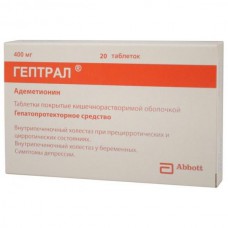Expiration date: 04/2026
Structure and Composition:
Tablets are enteric coated.
active substance (per 1 tablet):
ademetionina 1.4-butandisulfonat 760 mg (Equivalent to 400 mg ion ademetionine)
Additional ingredients: colloidal silicon dioxide - 4.4 mg Sodium carboxymethylstarch (type A) - 17.6 mg Magnesium stearate - 4.4 mg MCC - 93.6 mg
enteric coat: methacrylic acid-ethyl acrylate copolymer (1: 1) - 27.6 mg macrogol 6000 - Talc 8.07 mg - 18.4 mg of simethicone (30% emulsion) - Polysorbate 80 0.13 mg - 0.44 mg of sodium hydroxide - 0.36 mg of purified water - of qs
blister 10 pcs., in a cardboard pack 2 blisters.
Description pharmaceutical form:
Tablets, film-coated: Oval, biconvex, white to white with a yellowish tinge.
Pharmacokinetics:
Oral bioavailability - 5%. In a single oral 400 mg Smah - 0.7 mg / l Tmax - 2-6 hours.
Plasma protein binding - little, penetrate the BBB. It noted a significant increase in drug concentration in the cerebrospinal fluid.
It is metabolized in the liver. T1 / 2 -. 1.5 hours excreted by the kidneys.
Specially coated tablet, which dissolves only in the intestine, thereby ademetionine is released in the duodenum.
Description of the pharmacological actions:
Ademethionine refers to hepatic group also has antidepressant activity. It has choleretic and holekineticheskoe action has detoxifying, regenerating, antioxidant, antifibroziruyuschimi and neuroprotective properties. Fills deficit S-adenosyl-L-methionine (ademetionine) and stimulate its production in an organism, contained in all the environments of the body. The highest concentration of ademetionina observed in the liver and brain.
Performs a key role in the metabolic processes of the body, is involved in important biochemical reactions: transmethylation, transsulfatirovanii, transamination.
In the reactions of transmethylation ademetionine donates a methyl group to the synthesis of phospholipids of cell membranes, neurotransmitters, nucleic acids, proteins, hormones, and others. The reaction transsulfatirovaniya ademetionine is a precursor of cysteine, taurine, glutathione (providing redox mechanism cell detoxifying) coenzyme acetylation (included in biochemical reactions TCA cycle and replenishes the energy potential of the cells).
Increases of hepatic glutamine, cysteine ??and taurine in plasma reduces the serum methionine, normalizing the metabolic reactions in the liver. After participating in the decarboxylation reactions aminopropilirovaniya, as a precursor of polyamines - putrescine (stimulator of cell regeneration and proliferation of hepatocytes), spermidine and spermine, within the structure of the ribosome, which reduces the risk of fibrosis. It has choleretic effect.
Ademethionine normalize endogenous phosphatidylcholine synthesis in hepatocytes, which increases the fluidity and membrane polarization. This improves the function associated with the membranes of hepatocytes bile acid transport systems and facilitates passage of bile acids in the biliary system. Effective with intrahepatic (Lobular and interlobular) version of cholestasis (impaired synthesis and bile flow). Ademethionine reduces the toxicity of bile acids in the hepatocyte, exercising their sulfation and conjugation. Conjugation with taurine increases the solubility of bile acids and removing them from the hepatocyte. The process of sulfation of bile acids helps to eliminate the possibility of their kidneys, facilitates the passage through the membrane of hepatocytes and excretion of bile. In addition, the sulfated bile acids themselves also protect the liver cell membrane from toxic effects of non-sulfated bile acids (present in high concentration in the hepatocytes in intrahepatic cholestasis).
In patients with diffuse liver disease (cirrhosis, hepatitis) with intrahepatic cholestasis syndrome ademetionine reduces the severity of itching and changes in biochemical parameters, including the level of direct bilirubin, alkaline phosphatase activity, and other aminotransferases. choleretic and hepatoprotective effect lasts up to 3 months after stopping treatment.
The efficiency with hepatopathies caused by a variety of hepatotoxic drugs. Appointment of patients with opioid addiction, accompanied by lesions of the liver, resulting in regression of clinical manifestations of abstinence, improving the functional state of the liver and microsomal oxidation processes.
The antidepressant activity is shown gradually, starting with the end of the first week of therapy and stabilized for 2 weeks of treatment. Effective with recurrent endogenous and neurotic depression resistant to amitriptyline. It has the ability to interrupt the relapse of depression.
Assignment reduces the severity of osteoarthritis in pain syndrome, increase proteoglycan synthesis and leads to a partial regeneration of cartilage tissue.
Testimony:
intrahepatic cholestasis during pretsirroticheskih and cirrhotic conditions, which may occur in the following diseases:
- Fatty liver
- Chronic hepatitis
- Toxic liver disease of various etiologies, including alcohol, virus, medicines (antibiotics, anti-cancer, anti-tuberculosis and anti-viral drugs, tricyclic antidepressants, oral contraceptives)
- Chronic cholecystitis without stones
- cholangitis
- cirrhosis of the liver
- Encephalopathy, including associated with hepatic insufficiency (alcohol, etc.)
- intrahepatic cholestasis in pregnancy
- depression.
Contraindications:
- hypersensitivity to any component of the drug
- age 18 years.
Precautions: bipolar disorder (see section "Special Instructions".) Pregnancy (I trimester), lactation.
Application of pregnancy and breastfeeding:
The use of high doses of ademetionina in the III trimester of pregnancy did not cause any adverse effects. Use of the drug in pregnant Heptral I trimester and in the breast-feeding period is possible only if the potential benefit to the mother outweighs the potential risk to the fetus or child.
Side effect:
Among the most frequent adverse reactions observed: nausea, abdominal pain and diarrhea. Following are summary data on adverse reactions that were observed during treatment with ademetionina both tablets and injectable dosage form.
Immune system: laryngeal edema, allergic reactions.
Skin: Sweating, pruritus, rash, angioedema, skin reactions.
Infections and infestations: urinary tract infection.
From the nervous system: dizziness, headache, paresthesia, confusion, and insomnia.
From the CCC: hot flashes, phlebitis of superficial veins, cardiovascular disorders.
From the digestive system: abdominal distension, abdominal pain, diarrhea, dry mouth, dyspepsia, esophagitis, flatulence, gastrointestinal disorder, gastrointestinal bleeding, nausea, vomiting, hepatic colic, hepatic cirrhosis.
From the musculoskeletal system: arthralgia, muscle cramps.
Other: asthenia, chills, injection site reactions, flu-like symptoms, malaise, peripheral edema, fever.
Drug Interactions:
Known interactions with other drugs was observed.
There are reports of a syndrome of excess serotonin in patients taking ademetionine and clomipramine. It is believed that such an interaction is possible and should be used with caution in ademetionine with SSRIs, tricyclic antidepressants (such as clomipramine), as well as herbs and drugs containing tryptophan ..
Dosage and administration:
Inside, between meals, as a whole, without chewing, preferably in the morning.
Tablets Heptral drug should be removed from the blister immediately before ingestion. The dose is from 800 to 1600 mg / day.
The duration of therapy is determined by the doctor.
Overdose:
Clinical cases of overdose were reported.
Special instructions:
Given the invigorating effect of the drug is not recommended to take it at bedtime. In appointing the drug Heptral patients with cirrhosis of the liver on the background hyperasotemia requires systematic monitoring of residual nitrogen. During long-term therapy is necessary to determine the content of urea and creatinine in the blood serum.
Do not appoint ademetionine patients with bipolar disorder. There are reports about the transition depression hypomania or mania in patients taking ademetionine.
Patients taking Heptral, recommended to prescribe B12 and folic acid deficiency as cyanocobalamin (vitamin B12) and folic acid can reduce the concentration of ademetionina.
Children
The safety of the drug in children Heptral poorly understood.
Effects on ability to drive and use machines. Some patients may experience dizziness Heptral when taking the drug. Do not drive a car and operate machinery while taking the drug for as long as patients are confident that the therapy does not affect the ability to engage in this type of activity.


